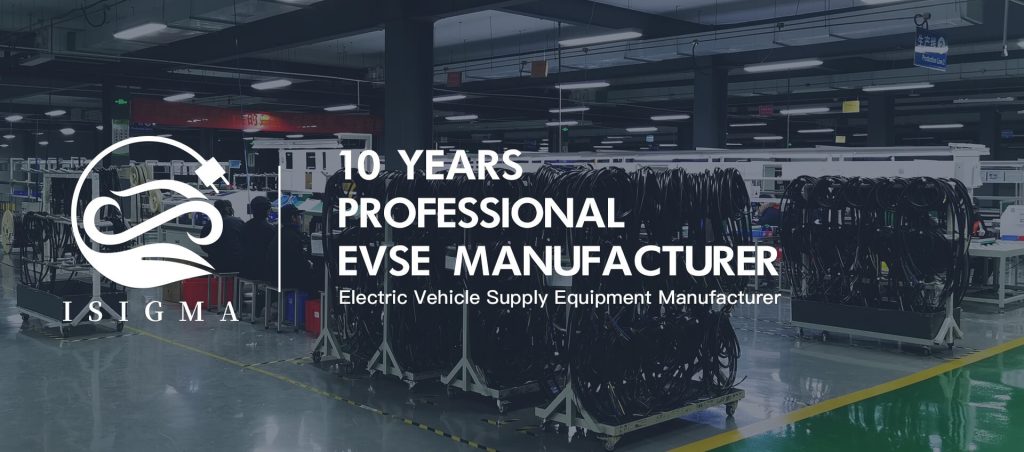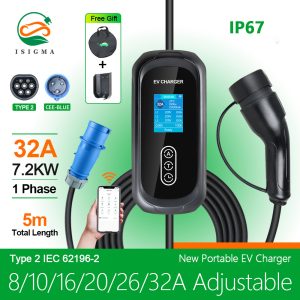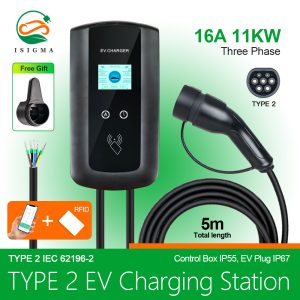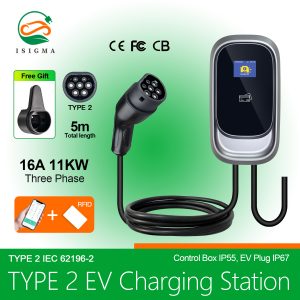Introduction
Electric vehicles (EVs) have gained significant popularity in recent years due to their eco-friendly nature and cost savings. As the demand for EVs continues to rise, the need for efficient charging infrastructure becomes essential. One of the most common types of EV chargers is the Type 2 EV charger. In this article, we will explore the features, benefits, and functionality of Type 2 EV chargers, shedding light on their importance in the EV charging landscape.
Table of Contents
- What Is an EV Charger?
- Understanding Type 2 EV Chargers
- Features of Type 2 EV Chargers
- Benefits of Type 2 EV Chargers
- Installation and Compatibility
- Type 2 EV Charger vs. Type 1 EV Charger
- Type 2 EV Charger vs. DC Fast Charger
- Charging Speed and Time
- Type 2 EV Charger and Electric Grid Capacity
- Type 2 EV Charger Manufacturers
- Type 2 EV Charger Pricing
- Future of Type 2 EV Chargers
- Environmental Impact of Type 2 EV Chargers
- Maintaining and Caring for Type 2 EV Chargers
- Conclusion
1. What Is an EV Charger?
An EV charger is a device that allows electric vehicles to charge their batteries. It provides the necessary electrical power to replenish the energy stored in an EV's battery pack. EV chargers come in different types and configurations to cater to various charging needs and vehicle requirements.

2. Understanding Type 2 EV Chargers
A Type 2 EV charger, also known as a Mennekes charger, is a widely used charging solution in Europe. It features a universal connector and is compatible with most electric vehicles. Type 2 chargers utilize the Mode 3 charging standard, which ensures safe and efficient charging.
3. Features of Type 2 EV Chargers
Type 2 EV chargers offer several features that make them highly desirable for EV owners. These features include:
- Universal Connector: Type 2 chargers come with a standardized connector, allowing compatibility with a wide range of EV models.
- Versatility: They support both single-phase and three-phase charging, accommodating different power supply configurations.
- Safety Measures: Type 2 chargers incorporate safety features like grounding detection and control pilot signaling to ensure safe and reliable charging.
- Data Communication: These chargers enable data exchange between the vehicle and the charging station, facilitating smart charging functionalities.
- Locking Mechanism: Type 2 connectors have a locking mechanism that secures the connection during charging.

4. Benefits of Type 2 EV Chargers
Type 2 EV chargers offer several benefits to both EV owners and charging infrastructure providers. These benefits include:
- Compatibility: Type 2 chargers are compatible with a wide range of electric vehicles, making them versatile and future-proof.
- Faster Charging: With the support for three-phase charging, Type 2 chargers can provide higher charging power, reducing charging time significantly.
- Convenience: The universal connector and standardized charging process make Type 2 chargers convenient to use at public charging stations.
- Smart Charging: Type 2 chargers enable advanced features like load balancing, scheduled charging, and integration with renewable energy sources.
- Cost-Effectiveness: Due to their widespread use, Type 2 chargers are competitively priced and readily available.
5. Installation and Compatibility
Installing a Type 2 EV charger requires professional assistance to ensure proper electrical connections and compliance with safety standards. These chargers can be installed at residential properties, commercial premises, and public charging stations. Compatibility with the electrical grid and the capacity of the charging station should be considered during installation.
6. Type 2 EV Charger vs. Type 1 EV Charger
While Type 2 chargers are more common in Europe, Type 1 chargers are prevalent in North America and Japan. The main difference lies in the connector design and power output. Type 1 chargers use a J1772 connector and support single-phase charging, whereas Type 2 chargers utilize a Mennekes connector and support both single-phase and three-phase charging.

7. Type 2 EV Charger vs. DC Fast Charger
Type 2 chargers are primarily intended for regular charging sessions, providing moderate power levels. On the other hand, DC fast chargers, also known as Level 3 chargers, offer high-power charging, allowing rapid charging of EVs. DC fast chargers require specialized infrastructure and are commonly found at public charging stations along highways.
8. Charging Speed and Time
The charging speed and time of a Type 2 EV charger depend on several factors, including the power output of the charger, the capacity of the EV's battery, and the availability of three-phase power. Higher-power Type 2 chargers can deliver faster charging speeds, significantly reducing the time required to charge an EV.
9. Type 2 EV Charger and Electric Grid Capacity
As the adoption of EVs increases, concerns about the electric grid's capacity to handle the additional load arise. Type 2 EV chargers, especially those supporting three-phase charging, can put a strain on the grid if multiple chargers are connected simultaneously. Proper planning and grid infrastructure upgrades are crucial to ensure a smooth transition to electric mobility.
10. Type 2 EV Charger Manufacturers
Several reputable manufacturers produce Type 2 EV chargers, including market leaders such as Tesla, Schneider Electric, ABB, Siemens, and EVBox. These manufacturers offer a range of chargers with different power outputs and features to cater to diverse charging needs.
11. Type 2 EV Charger Pricing
The pricing of Type 2 EV chargers varies depending on the manufacturer, power output, and additional features. Generally, Type 2 chargers are competitively priced, making them an accessible choice for EV owners. The cost of installation and any necessary electrical upgrades should also be considered.
12. Future of Type 2 EV Chargers
As the EV market continues to grow, Type 2 chargers are expected to play a significant role in supporting the charging infrastructure. The ongoing advancements in charging technology and the increasing emphasis on renewable energy integration will further enhance the capabilities and efficiency of Type 2 EV chargers.
13. Environmental Impact of Type 2 EV Chargers
Type 2 EV chargers contribute to reducing greenhouse gas emissions by promoting the use of electric vehicles. By utilizing renewable energy sources for charging and avoiding the reliance on fossil fuels, Type 2 chargers aid in creating a cleaner and more sustainable transportation system.
14. Maintaining and Caring for Type 2 EV Chargers
Regular maintenance and care are essential to ensure the longevity and optimal performance of Type 2 EV chargers. This includes periodic inspections, cleaning, and firmware updates as recommended by the manufacturer. Following the provided guidelines and promptly addressing any issues will help maintain the charger's reliability.

15. Conclusion
Type 2 EV chargers are a versatile and widely adopted charging solution that offers compatibility, convenience, and faster charging times. With their universal connector and support for both single-phase and three-phase charging, Type 2 chargers are poised to play a crucial role in the future of electric vehicle charging infrastructure. As the world transitions towards sustainable transportation, Type 2 EV chargers will continue to evolve, empowering EV owners with efficient and eco-friendly charging options.





